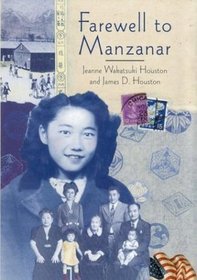I found this book to be OK. It really only had a few chapters relating to the internment in Manzanar--it was mainly about what happened before and after they got out of the camp. Would have liked to see pictures of her family so I could put a face with a name. Don't use this book if you are doing research into the camps but it was a good read about Japanese culture.
Reviewed by Taylor Rector for TeensReadToo.com
FAREWELL TO MANZANAR is the chilling autobiography of a Japanese-American girl who survived the interment camps during World War II.
When I began reading this book I had no idea what the "internment" camps were. This is a subject that not many know about and is not a very well-known time in history. "Internment" camps were camps that the American government put together after Japan bombed Pearl Harbor to house all of the Japanese-Americans who lived on the west coast. The people were forced to go and didn't have a choice, even if they were born in America and only had Japanese ancestry. The camps were in the middle of the desert, so that the people wouldn't be able to leave.
At first I didn't like the book very much. But as I kept reading I began to like it. I can't say that I loved it, because I didn't; it's not a "loving" type of story. I enjoyed learning about something that I knew nothing about.
I think all Americans should read this book so that they know that this happened. It is not something that is often talked about, but it should be, so that every American citizen knows about this part that the government played in World War II.
FAREWELL TO MANZANAR is the chilling autobiography of a Japanese-American girl who survived the interment camps during World War II.
When I began reading this book I had no idea what the "internment" camps were. This is a subject that not many know about and is not a very well-known time in history. "Internment" camps were camps that the American government put together after Japan bombed Pearl Harbor to house all of the Japanese-Americans who lived on the west coast. The people were forced to go and didn't have a choice, even if they were born in America and only had Japanese ancestry. The camps were in the middle of the desert, so that the people wouldn't be able to leave.
At first I didn't like the book very much. But as I kept reading I began to like it. I can't say that I loved it, because I didn't; it's not a "loving" type of story. I enjoyed learning about something that I knew nothing about.
I think all Americans should read this book so that they know that this happened. It is not something that is often talked about, but it should be, so that every American citizen knows about this part that the government played in World War II.
Pretty matter-of-fact telling. The author seems more upset about her cheerleading traumas after coming out of the camps than being interned, but that may be the nature of pre-teen vs. teen angst.




